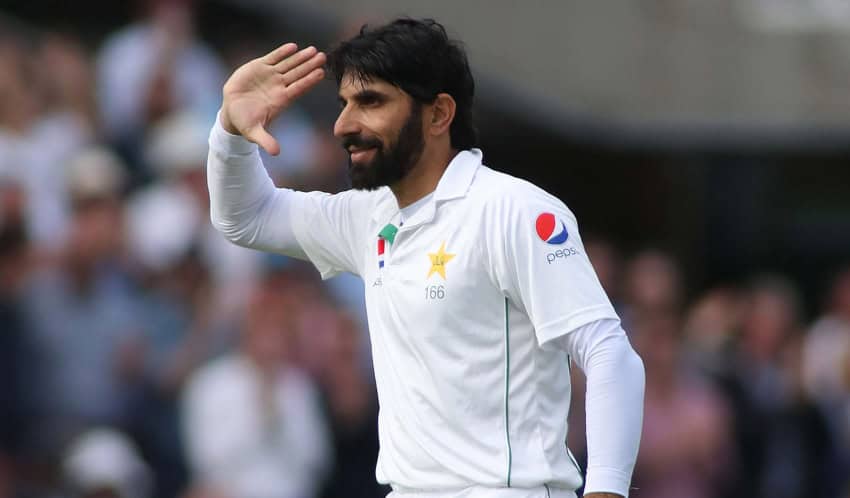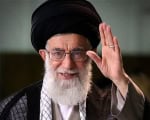My first conscious memory of Misbah is watching him play during the inaugural T20 World Cup. The first time I saw Misbah bat, I knew there was something special about this man. The T20 World Cup was Misbah’s cup. He set it all up from the start with spectacular chases and clean hitting. I still remember that the longest six from that tournament was Misbah’s at 111m until it was overtaken by Yuvraj’s 119m hit during his six-sixes. Misbah set it all up till the third ball of the last over of the World Cup where he threw it all away. It was a classic blunder of epic proportions. It broke my heart because as I saw the ball sail into the sky, I, along with 180 million of my countrymen, stood up in jubilation, only to have our hearts crushed when we saw the ball land in Sreesanth’s hands. That image of Misbah kneeled down with his head bowed in shock and disbelief haunted me for a long time. I wondered if someone could ever come back from this bottomless pit of accusations and finger pointing. We did, after all, lose to our arch rivals. It was not a joke.
Two things changed about Misbah from that day onwards, in my naïve and unprofessional opinion. One: Misbah gave up his explosive batting style in favor of a more defensive approach and two: he turned deaf to criticism. Whereas the former change has been much talked about, also earning him the nickname ‘Tuk Tuk’, the latter change is what propelled him from being an ordinary man to a leader amongst men. It is that very quality, of listening to his inner voice even in the face of sharp critique, which made him Misbah, and we all saw this in his unflappable temperament whether batting, fielding, Captaining, training, or just talking to media.
Misbah ul Haq firmly believed that despite all odds stacked against him, despite age and time not being on his side, despite the comparable lack of talent (as compared to the greats of the 90s); hard work, application, dedication and discipline would carry him through. And it all did. We can look at the numbers, or we can look at the story, or we can look at the story that the numbers are telling as well as the story that the numbers are not telling; we will arrive at similar conclusions if not the same; the conclusion being that Misbah ul Haq is the greatest captain we have had in the modern era of the game. I did not say the ‘most popular captain’ or ‘the most talented captain’ or ‘the most charismatic captain’. I said he was ‘the greatest captain’ and yes the competing set of captains does include the likes of Imran Khan and Wasim Akram.
If Imran’s legacy was having a great eye for talent and grooming it to achieve the extra ordinary, Misbah’s legacy has been to take a team broken by spot-fixing allegations, a team perpetually without home ground advantage, a team with no superstars; and instilling the spirit of hard work, discipline and application in them. His legacy has been to take a group of 11 men to the number 1 Test ranking by using the oldest trick in the book: belief. He made us all believe that we don’t have to be Imran Khan or Wasim Akram or Inzamam ul Haq in our lives to be able to say ‘Hey, I made it’. He showed us that we can still be rockstars if only we put down our heads and get to work; if only we can listen to our inner voice and follow the whispers in our heart; if only we can dream and then apply ourselves daily to achieve them; we can be whatever we want to be, we can touch the sky, and we can play international cricket at age 42 because dammit, there is no force that can counter hard work, application, passion and dedication in the long run.
As a cricket fan, I cannot help but draw analogies among players. It’s natural to do so, I feel. For e.g. Wasim’s legacy will be carried forward by Amir, Waqar’s Mach 1 was taken to Mach 2 by Shoaib, Miandad’s fort in the middle order was manned by Inzi and Saqlain’s shrewdness gave birth to Ajmal. But who does Misbah resemble or who will he inspire? Time will tell. He is unique, just like Afridi and Asif, with no peers or predecessors that bear resemblance in style and temperament. However, if Afridi and Asif occupy the left extreme on the “Talent/No discipline – Hard work/Discipline” spectrum, then surely Misbah occupies the extreme right. If Afridi is, in the words of the amazing Andy Zaltzman, ‘the average made extraordinary’ then Misbah is the opposite case of ‘the average BECOMING extraordinary’. And that is a far more motivating story than the other way round because while talent is a gift, hard work is a habit. And habits outdo gifts in the long run.
I understand that no cricket article is complete without statistics. I certainly will employ weird statistics to prove my point. If the reader thinks that my article is biased, that’s because it is. I would not have written this on the back of indifference. So we will start off by looking at the following summary of Misbah’s career in both Tests and ODIs.


The above tables are quite self-explanatory. I want to highlight that Misbah became a better player as a Captain; a trait seldom seen in cricket players. The added burden of responsibility not only made him a better leader in time, but also a better player. We can see that in his numbers. The Change % column shows the percentage increase/decrease of Misbah’s batting average as a Captain over his average when he was not the Captain. The numbers in Tests are staggering. He averaged 53% more in matches when he was the Captain. His average in victories was significantly higher, by 232%, but in all fairness the counterfactual is not sufficient in this case. He averaged 27% higher in Test defeats and 67% higher in ODI defeats as Captain. Now that is called leading from the front while going down with the ship. We saw it every single time. And now we have history to back our claims.
Here are Misbah’s Test and ODI batting averages as they progressed through his career, along with his form, which I measured as “last 30 innings’ moving average”:


In both cases, we can clearly see an improvement in batting average over time. Not only do these squiggly lines show a long term trend of improvement, but also an admirable consistency in form which was almost always above average across both formats until at the very end where form dipped. I guess we have to blame the 40s for that more than anything else. If only Misbah’s body obeyed him as much as his mind used to do.
A question may arise; okay so Misbah played better as a Captain and was a player that showed constant improvement in his career, but how does that make him a great Captain? Well, for starters we know that he has the most Test victories under his belt. But that alone is not enough. I wanted to dig deeper. So I looked up the set of players who have played Tests and ODIs for Pakistan in the Misbah comeback era (2007 to 2017) both under his Captaincy and under other Captains. It is important to note that to arrive at a decent set of counterfactuals, I chose players who had played at least 5 Tests and 10 ODIs both under Misbah’s Captaincy and otherwise. The results are shown in the tables below:


The results are astonishing. The green cells highlight positive impact and red cells highlight negative impact on player averages. We can clearly see that the green cells outnumber the red cells. Especially in Tests. This shows that Misbah’s Captaincy had a positive impact on other players’ performances too. This shows that Misbah had an impact which affected everyone around him favorably. Yes I have noticed that the reds outnumber the greens in ODIs. But I am not really bothered about the likes of Shoaib Malik, Kamran Akmal and Sohail Tanvir as I suspect them of deliberate underperformance as they were involved in the Captaincy wars that plagued our team. I may be wrong, but for now I leave you with this information to form your own objective view about Misbah’s impact as a leader.
If you are still not convinced, here are a list of achievements that may change your mind (copied off of Omair Aslam, who has done an amazing work of collecting these facts, Twitter: omairraslam):
- Misbah has the most Test wins by a Pakistani Captain, 2nd most Test wins by an Asian Captain, most Test wins in Away matches by an Asian Captain.
- Misbah has the most Test wins outside Asia for an Asian Captain and has the 2nd most Test wins by an Asian Captain in England, Australia, New Zealand and South Africa.
- Misbah has never lost a ‘home’ series in UAE. He is only the 2nd Asian Captain after Imran Khan to have a spotless record at home.
- No Asian Captain has made more Test runs than Misbah as Captain.
- Misbah ul Haq is the ONLY Captain in the history of Test cricket to have whitewashed both Australia and England.
- No Asian Captain in history has more Test wins against England than Misbah who has 7 wins in 10 Tests.
- Misbah led Pakistan to a series win against Australia in 2014 which was our first series win over Australia since 1994.
- Misbah has the fastest fifty (21 balls) and the 2nd fastest century (56 balls) in the history of Test cricket. Please YouTube those innings as both of them are Boss Innings and show Misbah’s rare moments of not exercising self-restraint.
- Under Misbah’s Captaincy, Pakistan registered the fastest 4th innings 300+ chase in Test history; chased down 302 in 57 overs at 5.25 RPO.
- Under Misbah’s Captaincy, Pakistan chased down 382 v Sri Lanka in the 4th innings; 6th highest successful chase in Test history.
- Under Misbah’s Captaincy, Pakistan also registered their highest 4th innings total ever by scoring 450 against Australia. It is also the 4th highest 4th innings total in Test history.
- Misbah has the 3rd highest batting average across all 3 formats for Pakistan behind Javed Miandad and Mohammad Yousuf.
- Misbah ul Haq is the 1st Pakistani Captain to win a Test series versus West Indies in the West Indies.
- Misbah is the 1st and ONLY Asian Captain to win an ODI series v South Africa in South Africa.
- No Pakistani pair has scored more Test runs as a partnership than Misbah and Younis Khan. They also have the most century stands.
- Misbah ul Haq is the oldest batsman since WW2 and the oldest Captain in Test cricket history to make a century. He did so at age 42y 43d.
- Misbah and Asad Shafiq have had 7 century stands for the 5th wicket in Tests; the most by any pair for the 5th wicket in Test history outshining the likes of Ponting/S. Waugh, Clarke/Hussey, Dravid/Laxman etc.
- Since WW2, no one has scored more runs and made more centuries after turning 40 than Misbah. Overall, he is only 2nd to the great Sir Jack Hobbs.
- Misbah has led Pakistan to 11 Test series wins; the most by an Asian Captain.
- Despite his age, Misbah can do more pushups than you or me.
On May 14, 2017, Pakistan completed a historic series win over the West Indies in the Caribbean. There has been a lot to say about Misbah since. Just about everyone, who is anyone, has participated in floating their opinion about him; opinions that are just as volatile as the man’s legendary calmness, opinions that are full of love, hate, praise, adulation, criticism, anger, respect and disdain, opinions that have never really mattered. The only thing that has mattered in the end is that Misbah ul Haq delivered. He delivered on his promises to fans, teammates, friends, family and most importantly, himself. While referring to the match, he said in his farewell address, in his familiar monotonous voice, with the lack of tone and expression he is known for, the following words:
‘A lot of frustrations, no-ball wickets, a couple of chances here and there, but I think you enjoy wins like that much more than straightforward wins.’
This is an extremely important line. It not only tells you about how important and spectacular the victory was, but also reveals an insight into the man himself, a man who has had the odds stacked up against him from the get go, a man who painstakingly wrote every word of his own story with passion, grit and determination so that when the final chapter comes, the reader is not only fully involved in the story, but also stunned at the fairy tale coincidence and unbelievable drama. Yes, Misbah never got it all on a silver platter. No sir, he had to work hard to get where he got. He had to toil year after year, bear the brunt of harsh acidic Pakistani criticism and return to the field every time with that distinct Misbah poker face. And then he finished it all off in style. Yes there were frustrations, a couple of chances here and there, but I think he enjoyed it all much more than if it had all been so straightforward.
He is, after all, a very straightforward man. There is an air of simplicity about him. He neither comes across as charming nor extroverted. Nor does he come across as fashionable or cunning or ruthless or debonair. No, he only comes across as himself, as he is. That was the Misbah who we first saw step on a cricket field. That was the Misbah who left the building and in between the stepping on and getting off of the cricket field, he set an example for all of us to follow. As a player, as a human being, a husband, a father, a countryman, a teacher and a leader; Misbah ul Haq’s story of how to turn the ordinary into extraordinary has left a lasting impression on me.
Do we think that Misbah was boring? Yes we do. Do we think that Misbah was predictable? Yes we do. Do we hate the fact that he was so boring AND predictable? Yes we do.
We hate all of that because we grew up on the charisma of Imran, the tenacity and swing of the Sultans Wasim and Waqar, the crude raw force that was Miandad, the super-sonic speed of Shoaib, the madness of Afridi, the smoothness of Asif, the lazy elegance of Inzi, and the style of Saeed Anwar. So when we think about Misbah amongst these stalwarts, our minds do not register it very well. Here is a boring man who leads us through boring victories and tortures us with slow dead draws. His style of thinking and of leading his men on the field was, and has been, unlike any of his predecessors’. It took us, certainly myself, some time to understand it. I, perhaps up till 2012 or 2013, looked at Misbah with suspicion. When I finally matured enough to be able to see what he is doing, I started to appreciate him more.
It has a lot to do with chess, which I started playing in 2013. If Wasim and Misbah were chess players, Wasim would be Kasparov and Misbah would be Karpov. Where the former was known for his attacking and tactical style of play, peppered with spectacular piece sacrifices to generate tactical brilliances, the latter was known more for a positional style of play categorized by strangling the opponent out of squares and spaces, not a very attractive playing style for audiences but extremely effective against opponents due to its strong defensive characteristics. Certainly we saw Misbah employing this in Tests. More so in our UAE stronghold where we ground down and whitewashed the Aussies and the Pommies. The strategic mind of Misbah and his amazing patience at playing the waiting game has helped us achieve victories in draws and draws in defeats. It really worked most of the time. In life you don’t need things to work out all the time. You just need them to work out more often than not; and then have faith in the Law of Large Numbers to turn that small advantage into a formidable force in the long run.
Misbah has had some turning points in his career, especially in the public’s eye. The ill-fated semi-final of the 2011 World Cup against India was certainly one. I still remember to this day that Misbah batted us into a hole that we couldn’t dig ourselves out of. We drowned with 29 runs adrift. I was shocked. I could not believe what I had seen. It was 2007 on repeat, albeit this time it stung harder because we all saw it coming, and we all chased the dread down to the last ball when Misbah skied one straight into Kohli’s hands.
Where did Misbah go wrong? Before we begin to answer that question, let us remind ourselves that a) Misbah was not the Captain and b) He was the highest scorer in that match from our side. Where the first reminder is merely a detail, the second reminder is something that will become Misbah’s hallmark in the years to come.
How many times have we seen Misbah in such a situation where the entire team lets us down and he alone is left to mop up the mess? How many innings have we seen with Misbah going down to the last ball, whether it is victory or defeat? How many times have we sighed with relief seeing Misbah come out to bat after our top order has been knocked out in quick fashion? It has been very common. We have all seen it. We are all witnesses to it, and we are all quick to blame Misbah for costing us those matches. Because who else could we blame? Surely not Umar Akmal or Mohammad Hafeez? They are hardly important enough to be bothered about.
We blame Misbah. Because we know that he knows that we know there is no one quite like him in our team. We know that we can blame Misbah because taking blame is what he’s so damn good at. He has been the Captain who goes down with the ship. And you don’t find Captains like that anymore. Farewell my Captain. You will be missed.














